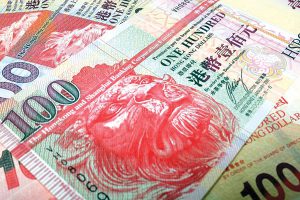Bloomberg
The Hong Kong dollar is poised for steeper losses as impending Federal Reserve rate hikes exacerbate capital outflows triggered by the deadliest Covid outbreak in the city.
The currency extended its drop to the lowest in more than two years and option-implied volatility indicates a 32% probability that it could fall to the weak end of its 7.75-7.85 per dollar trading band by the end of the second quarter.
BofA Securities Inc and Daiwa Capital Markets Hong Kong Ltd are among those betting on Hong Kong’s currency falling to 7.85 this year as Fed hikes reduce the attractiveness of the city’s assets. To make matters worse the government’s efforts to stamp out Covid are pushing the economy back into contraction this quarter.
“It may only take weeks to hit the 7.85 level after the Fed hike,†said Kevin Lai, chief economist for Asia ex-Japan at Daiwa Capital Markets, adding that “the biggest shake-up is yet to happen.â€
The city imports US monetary policies due to a linked
exchange rate with the greenback. However, funding costs in Hong Kong remain low as liquidity in the banking system stays ample, while interest rates are set to rise in the US, which is expected to hurt the appeal of the city’s assets.
Last month, the gap between the three-month interbank rate on the Hong Kong dollar — known as Hibor — and the funding cost on the greenback expanded to the largest since 2019.
One-year Hong Kong dollar forwards have also slumped this year, suggesting yields on the currency have been falling versus the greenback.
The combination of tightened social restrictions locally and higher interest rates in the US could lead to weaker loan growth and home prices, Bofa Securities strategist Chun Him Cheung wrote in a note, adding that the Hong Kong’s currency may slump to the weaker end of its trading band by the fourth quarter. The Hong Kong dollar was little changed at 7.81 per greenback.
Hong Kong is facing its worst virus outbreak to date as cases explode and deaths tick higher. Talks on a city-wide lockdown and plans for mass-testing
the city’s 7.5 million inhabitants for Covid have led to thousands of residents fleeing the city.
Bearish bets against Hong Kong shares have climbed to records and the benchmark Hang Seng Index is near a two-year low. The Hong Kong dollar has fallen to the lowest in nearly four years against the offshore yuan in another sign of weakening confidence in the city as residents ramped up deposits in the Chinese currency by the most since 2010 in January.
With authorities showing no appetite for a living-with-Covid strategy, combined with a more aggressive Fed tightening schedule, both factors could push the former British colony back into a recession, said Daiwa’s Lai.
 The Gulf Time Newspaper One of the finest business newspapers in the UAE brought to you by our professional writers and editors.
The Gulf Time Newspaper One of the finest business newspapers in the UAE brought to you by our professional writers and editors.
